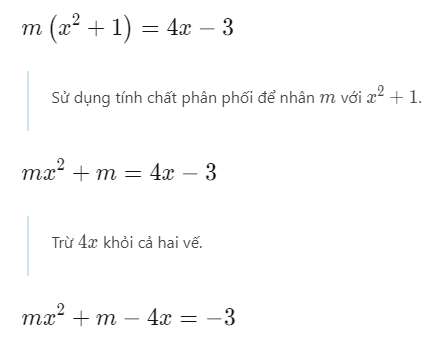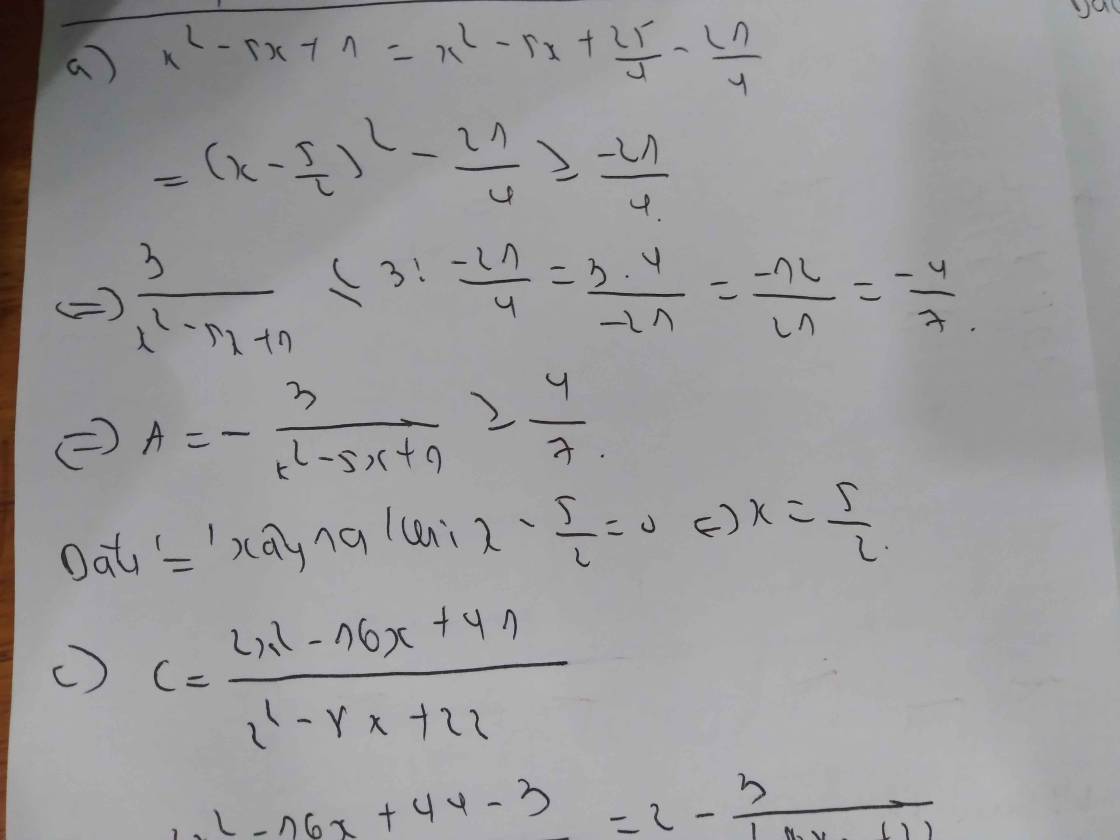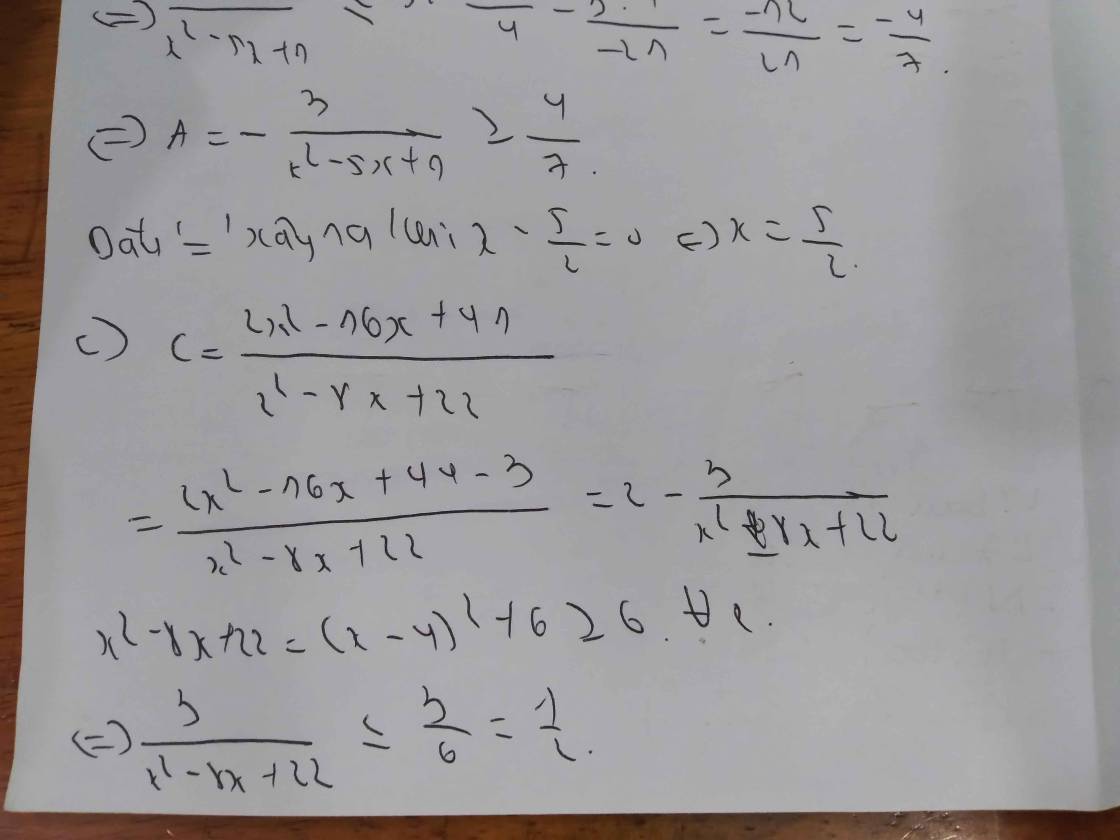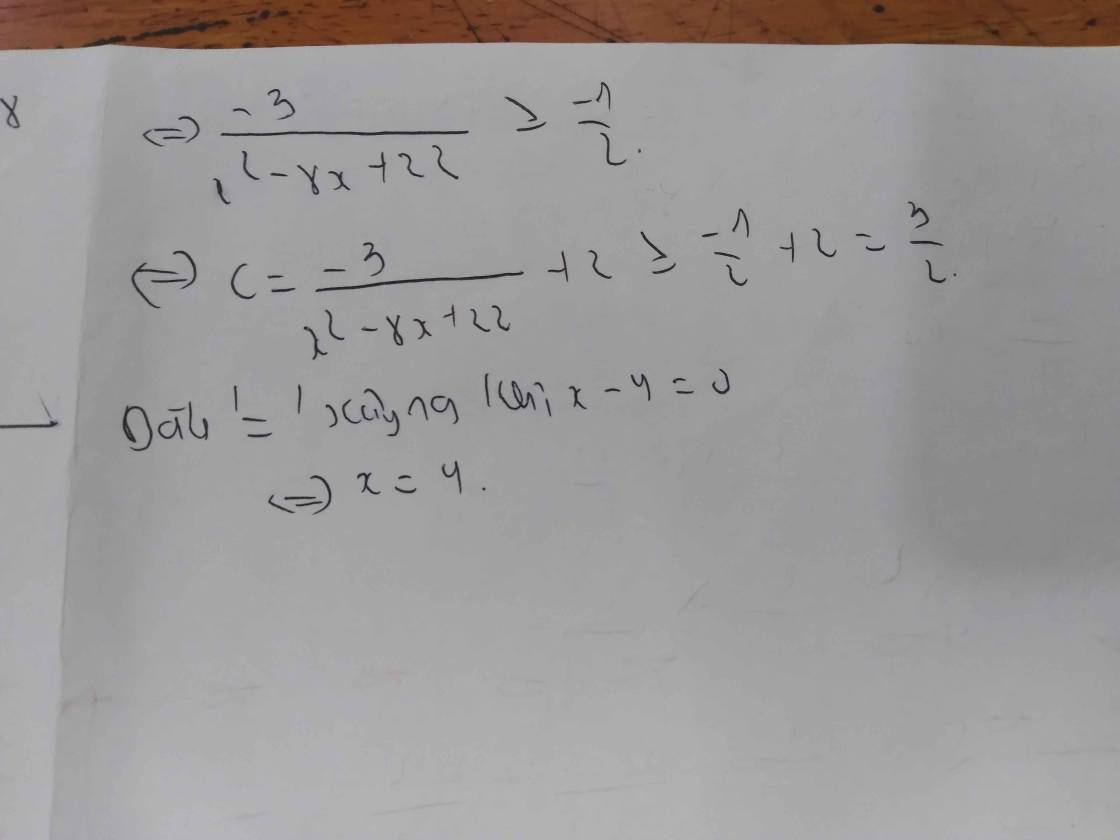Tìm giá trị lớn nhất của biểu thức P=\(\dfrac{4x-1}{x^2+3}\)
Hãy nhập câu hỏi của bạn vào đây, nếu là tài khoản VIP, bạn sẽ được ưu tiên trả lời.


\(\Leftrightarrow Mx^2+M=4x-3\\ \Leftrightarrow Mx^2-4x+M+3=0\\ \text{PT có nghiệm nên }\Delta'=4-M\left(M+3\right)\ge0\\ \Leftrightarrow4-M^2-3M\ge0\\ \Leftrightarrow-4\le M\le1\)
Vậy \(M_{max}=1\Leftrightarrow\dfrac{4x-3}{x^2+1}=1\Leftrightarrow x^2+1-4x+3=0\Leftrightarrow x=2\)

\(A=\dfrac{3}{x^2+4x+10}=\dfrac{3}{x^2+4x+4+6}=\dfrac{3}{\left(x+2\right)^2+6}\le\dfrac{3}{6}=\dfrac{1}{2}\)
\(A_{max}=\dfrac{1}{2}\Leftrightarrow x=-2\)

a) Ta có: \(M=\dfrac{8x+1}{4x-5}=\dfrac{8x-10+11}{4x-5}=\dfrac{2\left(x-5\right)+11}{4x-5}=2+\dfrac{11}{4x-5}\)
Để M nhận giá trị nguyên thì \(2+\dfrac{11}{4x-5}\) nhận giá trị nguyên
\(\Rightarrow\dfrac{11}{4x-5}\) nhận giá trị nguyên
\(\Rightarrow11⋮4x-5\)
Vì \(x\in Z\) nên \(4x-5\in Z\)
\(\Rightarrow4x-5\inƯ\left(11\right)=\left\{\pm1;\pm11\right\}\)
\(\Rightarrow x\in\left\{1;\pm1,5;4\right\}\)
Vậy \(x\in\left\{1;4\right\}\) thỏa mãn \(x\in Z\).
b) Ta có: \(A=\dfrac{5}{4-x}\). ĐK: \(x\ne4\)
Nếu 4 - x < 0 thì x > 4 \(\Rightarrow A>0\)
4 - x > 0 thì x < 4 \(\Rightarrow A< 0\)
Để A đạt GTLN thì 4 - x là số nguyên dương nhỏ nhất
\(\Rightarrow4-x=1\Rightarrow x=3\)
\(\Rightarrow A=\dfrac{5}{4-3}=5\)
Vậy MaxA = 5 tại x = 3
c) \(B=\dfrac{8-x}{x-3}\). ĐK: \(x\ne3\).
Ta có: \(B=\dfrac{8-x}{x-3}=\dfrac{-\left(x-8\right)}{x-3}=\dfrac{-\left(x-3\right)+5}{x-3}=\dfrac{5}{x-3}-1\)
Để B đạt giá trị nhỏ nhất thì \(\dfrac{5}{x-3}-1\) nhỏ nhất
\(\Rightarrow\dfrac{5}{x-3}\) nhỏ nhất
Nếu x - 3 > 0 thì x > 3 \(\Rightarrow\dfrac{5}{x-3}>0\)
x - 3 < 0 thì x < 3 \(\Rightarrow\dfrac{5}{x-3}< 0\)
Để \(\dfrac{5}{x-3}\) nhỏ nhất thì x - 3 là số nguyên âm lớn nhất
\(\Rightarrow x-3=-1\Rightarrow x=2\)
\(\Rightarrow B=\dfrac{8-2}{2-3}=-6\)
Vậy MaxB = -6 tại x = 2.
Mình làm sai câu a...
Ta có: \(M=\dfrac{8x+1}{4x-1}=\dfrac{8x-2+3}{4x-1}=\dfrac{2\left(4x-1\right)+3}{4x-1}=2+\dfrac{3}{4x-1}\)
Để M nhận giá trị nguyên thì \(2+\dfrac{3}{4x-1}\) nhận giá trị nguyên
\(\Rightarrow\dfrac{3}{4x-1}\) nhận giá trị nguyên
Vì \(4x-1\in Z\) nên \(4x-1\inƯ\left(3\right)=\left\{\pm1;\pm3\right\}\)
\(\Rightarrow x\in\left\{\pm0,5;0;1\right\}\)
Vậy \(x\in\left\{0;1\right\}\) thỏa mãn \(x\in Z\).




Khi \(x=\dfrac{1}{4}\Leftrightarrow P=\dfrac{4.\dfrac{1}{4}-1}{\left(\dfrac{1}{4}\right)^2+3}=0\)
Khi \(x\ne\dfrac{1}{4}\Leftrightarrow P\ne\dfrac{4.\dfrac{1}{4}-1}{\left(\dfrac{1}{4}\right)^2+3}\Leftrightarrow P\ne0\)
\(P=\dfrac{4x-1}{x^2+3}\Leftrightarrow Px^2-4x+3P+1=0\) là pt bậc 2 do \(P\ne0\)
\(\Delta'=\left(-2\right)^2-P\left(3P+1\right)=-3P^2-P+4\)
Để pt có nghiệm thì \(\Delta'\ge0\Leftrightarrow-3P^2-P+4\ge0\Leftrightarrow-3\left(P+\dfrac{1}{6}\right)^2+\dfrac{49}{12}\ge0\Leftrightarrow P\le1\)
\(maxP=1\Leftrightarrow\dfrac{4x-1}{x^2+3}=1\Leftrightarrow x^2-4x+4=0\Leftrightarrow x=2\left(tm\right)\)
\(P=\dfrac{4x-1}{x^2+3}\)
\(\Leftrightarrow x^2P+3P-4x+1=0\)
\(\Leftrightarrow Px^2-4x+3P+1=0\left(1\right)\)
\(\left(1\right)\) có nghiệm khi:
\(\Delta'=4-P\left(3P+1\right)=-3P^2-P+4\ge0\)
\(\Leftrightarrow P\in\left[-\dfrac{4}{3};1\right]\)
\(\Rightarrow P_{max}=1\Leftrightarrow x=2\)